When my father was a kid, he and his brother Carl sneaked into the top floor of a hotel where a large group of major league baseball players were meeting … probably in the late 1930s.
I’m told they got the autographs of Babe Ruth and Lou Gehrig, among others, but that their mother eventually threw them out.
My grandmother may not have had much use for those autographs, but my mother knew what baseball meant to me. So when I wanted to get autographs of players in my hometown of Anaheim … or in downtown Los Angeles … she let me go … nearly always with a friend or two.
Last time, I wrote about experiences I had with six baseball Hall of Famers from the 1960s: Hank Aaron, Ernie Banks, Roberto Clemente, Reggie Jackson, Al Kaline, and Harmon Killebrew.
Here are encounters with six more players, including the three most celebrated superstars of the 1960s:
Seventh, Sandy Koufax.
I can’t begin to tell you how much Sandy Koufax meant to me as a kid growing up in the greater Los Angeles area.
Due to Walter O’Malley’s stinginess, the Dodgers only televised nine games per year … all from Candlestick Park in San Francisco … so I could only see Koufax pitch on television three times a year, at best … unless the Dodgers went to the World Series, which they did three times in four years.
I did see Koufax pitch twice in person: a three-hit, 3-0 shutout against the Houston Colt 45s (now the Astros) on June 14, 1963, and a 4-2 victory against the Milwaukee Braves on October 2, 1965 … a game that clinched the pennant for the Dodgers.
Koufax pitched four no-hitters, one each year from 1962-1965 … won five consecutive ERA titles … set the (then) all-time record for strikeouts in a season with 382 … twice struck out 18 batters in a game … and had a mystique about him that’s unique even for today.
In 1966, he won 27 games and lost only 9 … and then retired at age 30 due to injuries.
I once saw Koufax on the field before a game and yelled “Sandy!” … from the Bob Uecker seats … and he actually looked up toward me.
Following the 1965 season, Koufax published an autobiography appropriately titled Koufax. My parents gave it to me for Christmas … personally signed.
I couldn’t believe it … and still have it.
In 1967, Koufax became an announcer for the Game of the Week on NBC, and he was in Anaheim for the All-Star Game. The night before the game, I got his autograph in my autograph book.
Although he threw left-handed, Koufax batted … and signed … right-handed.
Then I went home for dinner … begging to be taken back to the hotel … and grabbed a mint condition 1955 Koufax rookie card for him to sign if I saw him again that night.
I did see him … and he did sign it … and this may have been the first baseball card I ever got signed.
I have not taken it out of this binder for nearly 50 years.
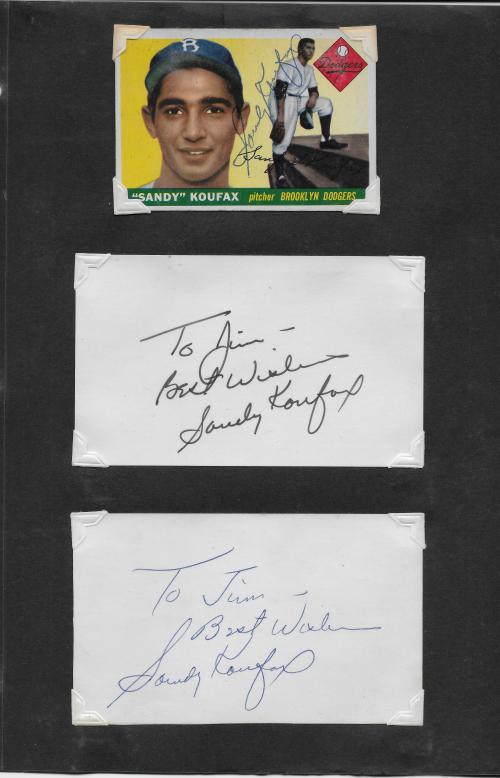
Of course, all this was before vintage cards … or rookie cards … were worth anything monetarily.
I’ve been told that by getting the card signed, I have greatly reduced its value, but I never collected cards with the idea of reselling them, and I never got autographs to sell them, either.
Koufax was a good signer through the mail in the early 1970s, and I was able to get all my cards signed that way, although I risked losing some increasingly valuable cards.
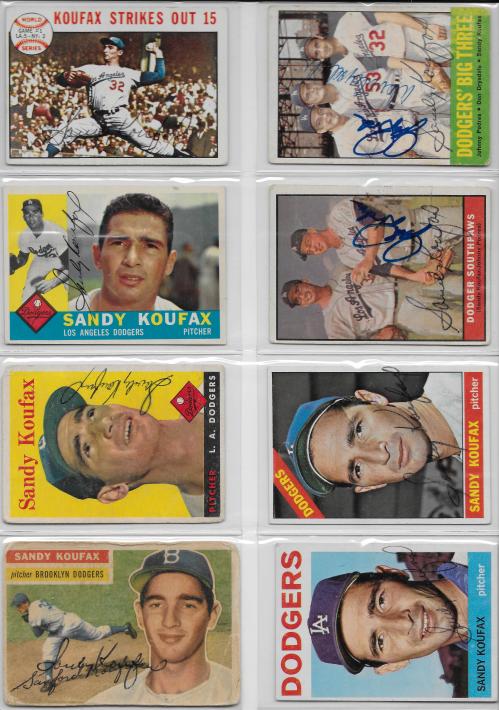
The only other time I saw Koufax in person was at spring training in Vero Beach, Florida, in 1980. My brother and I went together for a week and had an absolute blast.
Here’s Koufax being mobbed by fans:
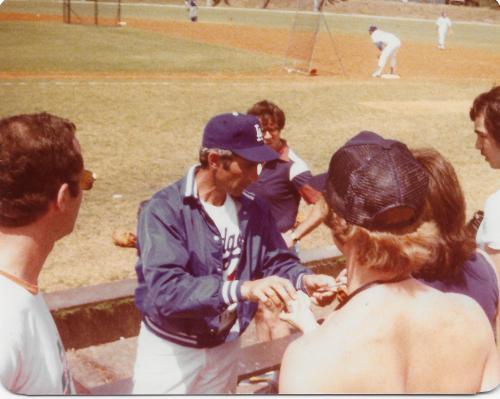
Sandy is still alive and in his early 80s. Jane Leavy’s book Sandy Koufax is a terrific read, as is Michael Leahy’s book The Last Innocents, which takes a close look at seven Dodgers’ players from the 1960s, including Koufax.
Eighth, Mickey Mantle.
The first day I ever got autographs at a hotel was at the Grand Hotel in Anaheim in April 1967.
The New York Yankees were in town, and I brought along an autograph book that had been signed by friends from fifth and sixth grade … I kid you not.
When we arrived at the hotel, there was a huge window looking into the coffee shop, and there sat Mickey Mantle … eating an ice cream sundae.
Upon spotting Mantle, some kids rushed into the coffee shop, but Mantle said he would sign when he came out … which he did … in my autograph book.
Over the next two years … 1967 and 1968 … Mantle signed at least five times other times for me … once every road trip. (The Yankees came to Anaheim three times a year back then.)
Here are three of those signatures (remember, we didn’t have Sharpies back then):
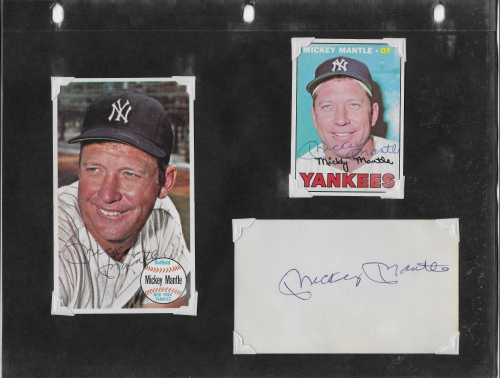
Here are a few Mantle stories:
*A friend of mine joined me at the hotel one day to get Mantle’s autograph, and when he did, Mantle made a snide comment about his appearance, which ended up circulating all around our Jr. High school.
*My brother John and another friend decided to ride the central elevator at the Grand Hotel (which they weren’t supposed to do) and when the elevator stopped at a certain floor, Mantle got on. When they asked him for his autograph, he yelled at them.
*A kid in a wheelchair once waited for Mantle to emerge from the hotel, and when he did, Mantle went right up to him, but the kid didn’t have a pen for Mantle to sign anything with. I quickly offered my pen, and when Mantle was done, he asked, “Whose pen is this?” I said, “Mine,” and Mantle signed my item next.
*I wasn’t there, but I was told that a fan wanted a picture taken with Mantle in front of the small fountain outside the hotel. The fan was so nervous that he fell in the fountain.
*My brother’s friend Mark joined us one afternoon to try and get Mantle’s autograph. When Mantle came out of the hotel, he signed for my brother, then boarded the bus. When we motioned for Mantle to open the bus window, he did. When Mark asked him for his signature, Mantle mistakenly told him, “I already signed for you,” and signed another one for my brother … which he turned and gave to Mark.
The last time I saw Mantle was before an Old-Timers game at the Sheraton Hotel in Anaheim around 1971. Mantle took my card … turned and stared at me for a moment … and then signed it.
He and Johnny Bench were the most intimidating players I ever asked for autographs. Maybe Bench is nice now (as he seems to be on a TV commercial), but he was tough during the latter part of his playing days.
According to former teammate Bobby Richardson, Mantle became a Christian in the closing days of his life in 1995, so I look forward to seeing the Mick again.
Ninth, Juan Marichal.
Growing up a Dodgers fan, the San Francisco Giants were their rivals … and when the Dodgers went to Candlestick Park, they could not hit Giant pitcher Juan Marichal.
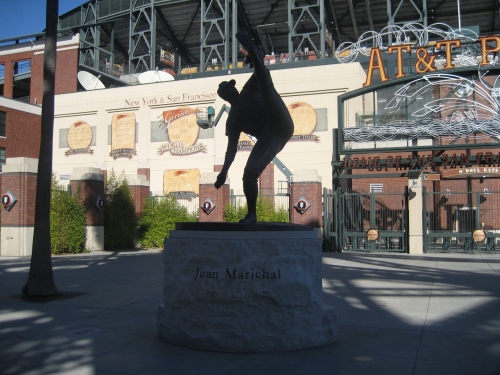
Marichal threw nine different pitches from three different angles (overhand, three-quarters, and sidearm) … a total of 27 different looks for a batter … but he was best known for his high leg kick, portrayed in this statue outside AT&T Park in San Francisco.
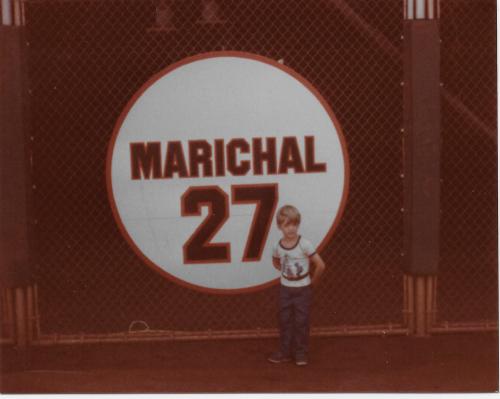
Believe it or not, the Giants used to hold a picture day at Candlestick Park in the early 1980s, and I got this picture of Ryan in front of Marichal’s number on the outfield fence.
The first time I got Marichal’s autograph was in 1968 at the Grand Hotel when the Giants came to Anaheim for an exhibition game on a Saturday before the season started.
The next time I saw him was at the Ambassador Hotel in Los Angeles around 1971 … the same hotel where Bobby Kennedy was shot in June 1968. Marichal looked at me and asked, “Why don’t you go and get a job?” (I worked for McDonald’s at the time but got off work to go and see the Giants.) He usually signed only one item back then.
But the following year … 1972 … Marichal changed his disposition and signed everything in sight!
(The typical pattern is that players start off as good signers … become grumpier after gaining fame or stardom because average people, not just baseball fans, start to recognize them in public … become even worse as they near retirement … and then after a year or two out of the game, become better signers once again.)
Besides the “job” comment, I had only two other encounters with Marichal.
In 1983, Marichal appeared at a card show in Santa Rosa, California, and the autographs were only $2.50 each. Marichal signed a lot of cards for me that day, and shook my hand afterwards. He couldn’t have been nicer.
Several years later, Marichal appeared at a baseball clinic for kids several miles from my house, and he generously signed six cards.
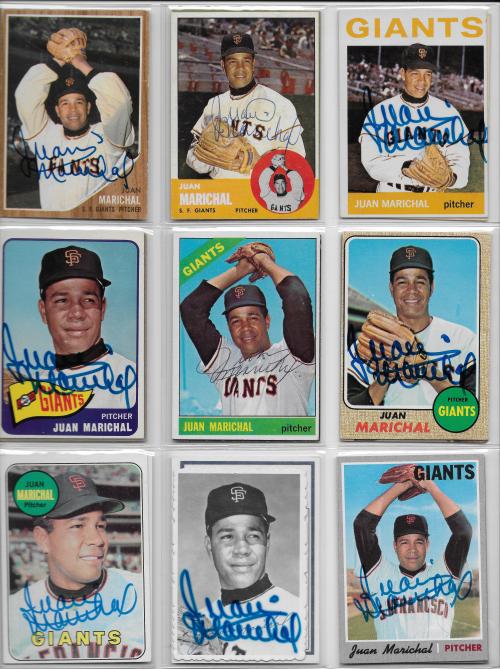
Marichal may be best known for clubbing Dodger catcher John Roseboro with a bat at Dodger Stadium in the heat of the pennant race in August 1965.
John Rosengren has written an inspiring book about that incident and the subsequent relationship between the two men called The Fight of Their Lives: How Juan Marichal and John Roseboro Turned Baseball’s Ugliest Brawl into a Story of Forgiveness and Redemption. I keep meaning to write a blog about the book and hope to get it done sometime.
Tenth, Willie Mays.
Willie Mays is considered by many baseball experts to be the greatest all-around player in the history of the sport. He played with passion, charisma, and daring.
And he was my brother John’s favorite player.

The first time I got Mays’ autograph was at the Grand Hotel in 1968 … the same occasion when I first got Marichal’s autograph.
When the players came off their bus, my brother and I followed Mays into the hotel, and I took a photo of the two of them. I still have it … somewhere … but the flash didn’t work, and Mays made a comment about it at the time.
I was fortunate enough to get his signature three times that day … unlike Mantle, Mays never looked at who he was signing for … but all three signatures were different. His autograph didn’t become uniform until he started signing at shows years later.
The next time I got his autograph was at spring training in Palm Springs in 1971. My friend Dave and I went to the Giants hotel but we saw Mays slip away while wearing his uniform. We jumped in Dave’s Volkswagen, followed Mays to the park, and got his autograph just as he was going into the clubhouse … but his signature (which I still have) was lousy.
This sets up the craziest autograph story I’ve ever experienced.
Remember how I mentioned earlier that the Giants stayed at the Ambassador Hotel in Los Angeles when they came to town?
Well, one time in 1972, five of us went to the Ambassador in my friend Dave’s VW bug. We got the autographs of most of the Giants … they came out the front for a cab or to take the bus … but we missed Mays … who usually rented a car, parked out back, and drove to Dodger Stadium himself.
If we waited for Mays, we’d miss the other Giants, and we didn’t want to do that … but maybe, we thought, we can get him after the game.
However, the Giants boosters were also staying at the hotel, and somehow, one of our group found out the room number where Mays was staying … information that didn’t interest me at all.
So after the game, Mays came out of Dodger Stadium, signed maybe one autograph (with a huge crowd surrounding him), got in his car, and took off.
Please understand that back in the early 1970s, the best way to get a player’s autograph was at the team hotel. You could write a player in the mail, but if he didn’t answer, you’d lose your valuable cards, and that was a tough risk to take.
I don’t remember who made the suggestion, but somebody said, “Hey, let’s see if we can catch Mays at the hotel.” So we drove to the Ambassador and waited … but there was no sign of Mays anywhere.
And then someone made this fateful suggestion: “Hey, I’ve got Mays’ room number. Why don’t we go up to his room and ask him to sign for us?”
I’m sure I said, “No! Bad idea! Let’s just go home.”
But what if Mays was really cool and signed for us?
Someone else prevailed, and the next thing I knew, two of my friends were knocking on the hotel room of Willie Mays … just after midnight.
Mays opened the door, and he was wearing maroon pajamas. He took a look at the five of us … I was hiding a bit down some stairs … and one of the five asked, “Willie, can we have your autograph?” Mays asked, “Who are you guys with?” My friend replied, “We’re with the Giants boosters, Willie. Can we have your autograph?”
As Mays peered into the hallway and saw five of us, he said, “I’m going to call the house man on you.”
We ran … down the stairs … into the basement … up some stairs … across the back lawn of the Ambassador … and found Dave’s VW. Dave peeled out down Wilshire Boulevard, and when he hit the Harbor Freeway, went 85 mph … as far from the Ambassador Hotel as we could get.
The next morning, I had a crew meeting at McDonald’s, and I kept waiting for the cops to come and arrest me.
Years later, I started a sermon with that story, and Dave … who also became a pastor … has used it as well.
While discussing this incident a few years ago, we both admitted that we’re still waiting for someone to come and arrest us for what we did to poor Willie 45 years ago.
Since that incident, I’ve gotten Mays’ autograph through two main venues: in spring training and at a card show (where his signature was only $2.50).
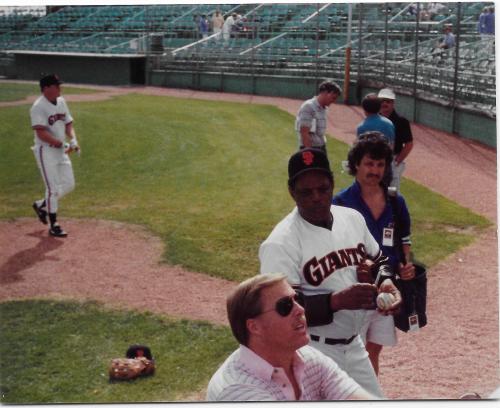
I once read where Mays said that everywhere he goes, if he signs one autograph, he ends up signing 100. I can’t imagine what it’s like to be so visible … and so popular … and Mays has gained a reputation as somewhat of a grouch over the past few decades.
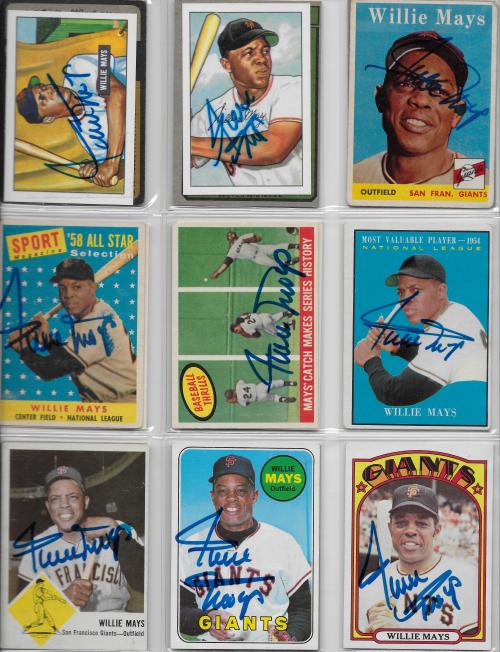
And after what we put Mays through at the Ambassador Hotel, I can’t blame him.
Sorry, Willie.
Mays can hardly see anymore … if at all … and the last I heard, he charges $100 per autograph.
Eleventh, Willie McCovey.
McCovey played on the Giants with Marichal and Mays, and when Don Drysdale of the Dodgers pitched against him, McCovey absolutely murdered him.
Big Stretch became the Most Valuable Player in the National League in 1969 and hit 521 home runs in his career. He and Mays formed a powerful one-two punch.
McCovey was always pleasant and would sign one item whenever we saw him.
One time, we left the Ambassador Hotel and followed the Giants’ bus all the way to Dodger Stadium. McCovey sat in the very back of the bus, and we saw his silhouette all the way to the ballpark.
In 1982, McCovey made an appearance at the Old Mill Shopping Center in Mountain View, near our home in Santa Clara, and I took the whole family after church. Each autograph was only $1.00.
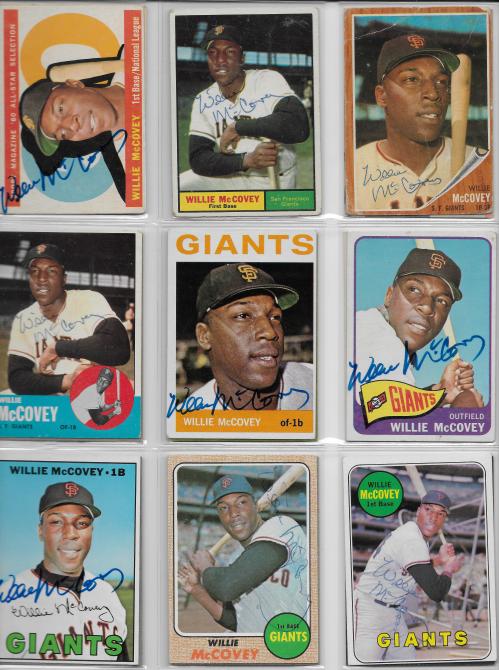
I took this picture of my son Ryan with McCovey:
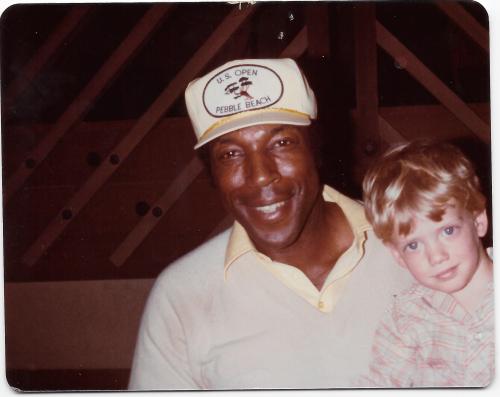
After he retired from the Giants, McCovey held an annual golf tournament at the Olympic Country Club near San Francisco every November. Back in the 1980s, I went up there a few times and had a great time getting autographs. Baseball players and other celebrities (like Huey Lewis) would practice their drives and putts, then go to their golf carts and just sit there waiting to go to the first hole.
Some collectors would wait by a certain hole and wait for the golfers to finish before asking them to sign something, but I went early and got autographs while everyone was still loose … and happy.
When I was a pastor in Silicon Valley in the 1990s, a guy in the church did landscaping for McCovey at his home in Woodside. I asked him if he would ask McCovey if he’d sign a few things for me.
McCovey said no.
When the Giants built their new ballpark in south San Francisco, they named the cove behind the right field fence “McCovey Cove” in honor of Willie. Many years later, I had the privilege of riding in the cove in a Duck Boat … piloted by my pastor friend Peter Muthui from Kenya.
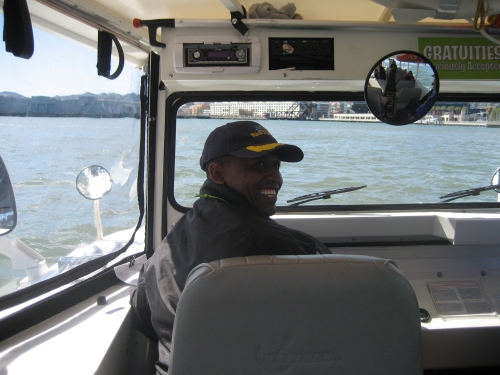
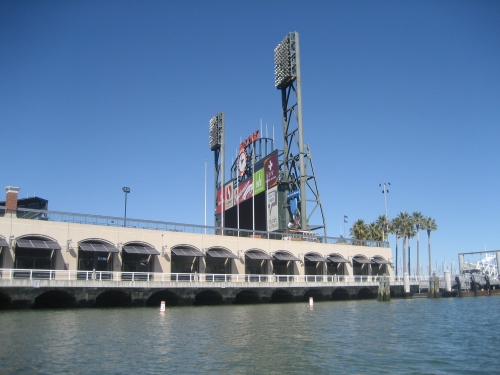
If you look closely at the photo below, you’ll see a statue of McCovey swinging a bat just above the rocks.
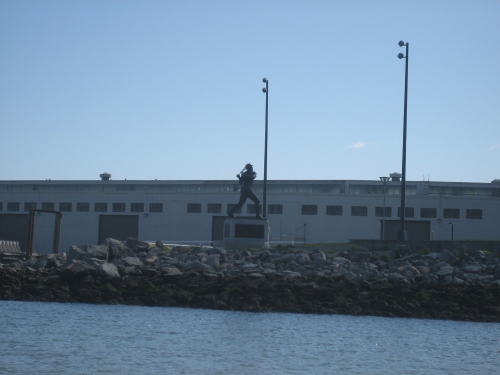
Finally, Frank Robinson.
Frank Robinson was the first player to win the Most Valuable Player Award in both the National League (1961) and American League (1966).
I first got his autograph at the Grand Hotel in 1967. I was by myself, and Frank was okay.
But Frank could be a bit on the mean side. With no one else around, I once asked him to sign his rookie card from 1957 in spring training as he was going from the parking lot into the clubhouse.
I can still hear him let out a yell … but he signed it.
Because he lived in Los Angeles, I saw him a few times at Lakers games in the late 1960s.
Frank was traded to the Dodgers in the early 1970s. One night, he came out to his car and signed for everybody … something I wasn’t used to seeing.
Frank became manager of the Giants in the early 1980s, and I took a photo of him with Ryan at a Picture Day:
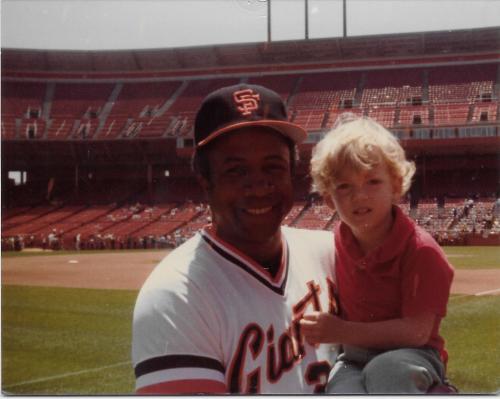
Frank did a card show in the Bay Area in the 1990s … along with Ricky Henderson … and each autograph was $4.50 … bargains then and now.
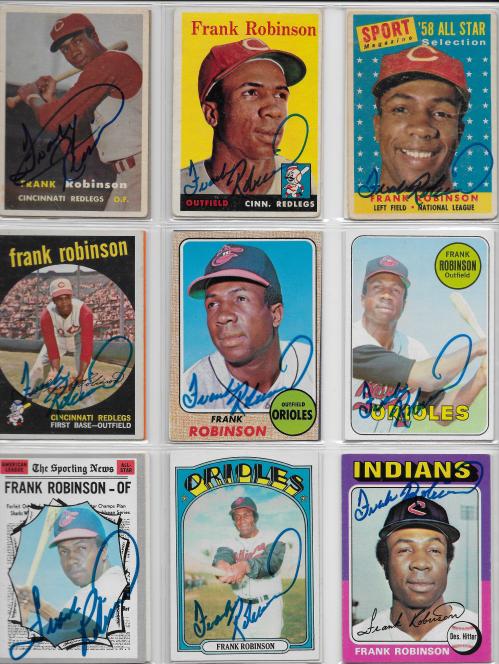
The last time I saw Frank was after Harmon Killebrew’s memorial service at Christ’s Church of the Valley in Peoria, Arizona. Due to the solemnity of the occasion, I wasn’t about to ask him … or anyone else … for a signature, but I did take his photo with my (pathetic) Blackberry.
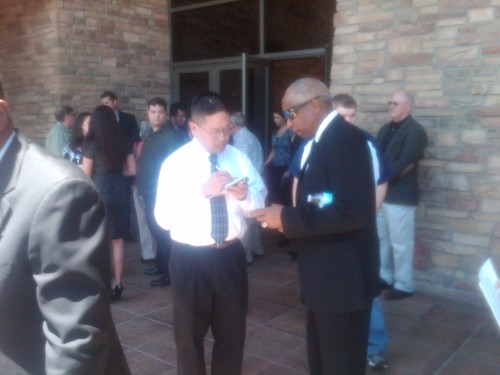
After the Mays incident, I never violated a player’s privacy again, asking for an autograph only when they were in a public place.
I’ve got a lot more stories to tell … like the time a player invited me to lunch … or the time I drove a Dodger to the stadium the day before the All-Star game … or the time the league’s leading hitter sat down and talked to me for twenty minutes … or the time …
Read Full Post »



















When a Church Conflict Reaches an Impasse
Posted in Church Conflict, Church Health and Conflict, Conflict with Church Board, Conflict with the Pastor, Please Comment!, tagged church conflict, church conflict manager, church consultant, church interventionist, hiring a church conflict manager, Moving Your Church Through Conflict, Speed Leas on March 23, 2017| Leave a Comment »
When a husband and wife aren’t getting along … and they can’t seem to resolve their issues … they may seek out a third party: a counselor.
When an employee feels she’s been wronged by her employer … and she’s tried but can’t resolve the issues inside her company … she may seek redress from a third party: a judge.
But when people in a church are in conflict and they aren’t able to resolve matters, what do they do?
They usually choose up sides … exonerate themselves … demonize their opponents … put their heads down … and attempt to bulldoze their way to victory … even if it splits their church wide open.
There is a better way.
Church conflict expert Speed Leas, in his brilliant manual Moving Your Church Through Conflict, believes there are five levels of conflict in a local church.
Leas says that conflict at levels one through three can be resolved by God’s people within their local church.
But when a conflict escalates to levels four and five, the conflict cannot be resolved inside the church. It’s gone too far.
The church needs outside intervention instead.
But in my experience, the great majority of Christians resist that idea.
Years ago, I served as pastor of a church where we were being cheated by a building contractor. He was billing us for his work … we’d pay him … but then rather than pay his sub-contractors, he’d divert the funds to other projects he had.
The sub-contractors were naturally upset that they weren’t being paid and came to us for the money … but we’d already paid the contractor.
We held a board meeting, and it was a bit tense because I wanted us to go to an attorney, while someone else felt it would be a waste of time.
I understand the sentiment: “Look, this is our problem, so we need to be the ones to solve it. All we’ll do is make the attorneys richer.”
But sometimes, the biggest barrier to resolving a conflict is our pride. We just don’t want to admit that someone else knows how to handle matters better than we do.
According to Leas, a conflict at Level Four has the following characteristics:
*Each group stops talking with the other, even when they’re in the same room.
*Each group is convinced that the other party “won’t change.”
*Each group no longer wants to win … they want to hurt the other side.
*Each group takes on an air of self-righteousness: “We’re right … they’re wrong.”
*Each group uses threats and demands against the other.
*Each group takes the stance: “Either he/they leave(s) or we will.”
When a conflict reaches Level Five, one side wants to destroy their opponents.
At Level Four, a faction may want their pastor to leave.
At Level Five, they want his position … his health … his family … and his career decimated.
I have been on the receiving end of both Level Four and Level Five conflict, and in both cases, the opposing group left the church. In the first case, the conflict died down. In the second case, the conflict got worse.
If a church is having a conflict, the chances are great that the pastor has become involved somehow. Either he’s perceived as “the problem” or he hasn’t yet “fixed the problem.” And the anxiety around the church becomes so great that people begin to wonder, “If our pastor is this incompetent or this useless, why should he stay?”
So when a conflict hits Level Four … or if it quickly leapfrogs to Level Five … the church board needs to seek outside intervention as soon as possible.
Here are five reasons to seek outside help:
First, the current church leadership has been unable to resolve the conflict at Levels One, Two, or Three where it’s much more manageable. If they can’t manage things at the lower levels, they’ll never be able to manage matters at the highest levels. They need an outsider.
Second, many church leaders have either been in their church for many years, or their present church is the only one they’ve ever known. They’re so immersed in their present church culture that they don’t know how pastors and boards in other churches handle conflict … but an outside interventionist almost assuredly does. He will help them broaden their thinking.
Third, pastors and church leaders can become so anxious and stressed about a conflict that they think they’re going crazy. They become so irrational that all they want to do is get the conflict over with. An outside interventionist comes in with a clean slate … no emotional investment … and a neutral approach that seeks the good of the church as a whole, not just the pastor, board, or a vocal faction.
Fourth, pastors and church leaders usually lose control of the process when a conflict erupts in their congregation. An outside interventionist can remind everyone of what Scripture says, what the church constitution/bylaws say, and what secular law says about how Christians are to treat one another. The interventionist can set ground rules for behavior and remind people when they have crossed the line.
Finally, the interventionist can teach the leaders … and by extension, the congregation … new skills, processes, and resources for managing conflict in the future.
Let me share my story along this line.
Seven-and-a-half years ago, I found myself in the worst conflict of my 36-year ministry career. I didn’t know which Christian leaders to contact, so I contacted everyone I knew outside my denomination.
The name of a Christian leader popped into my head … someone who had once commended me on an article I wrote in a Christian magazine … so I looked him up online and made a phone appointment with him.
He had been a pastor … a district executive … and a denominational president. Later on, I found out he was considered to be the best-networked evangelical leader in Southern California.
We had a two-hour conversation. He gave me more valuable counsel over the phone that day than the other sixteen leaders I contacted combined.
He later became my mentor … and my friend … giving me hours of his valuable time, and advising me at key times when I needed to make a major decision.
My conversation with that leader was free. He recommended I speak with the head of the consulting firm that he worked for, so a few hours later, I did.
After about a 45-minute conversation, the consulting head told me, “Jim, we need to get someone to your church as soon as possible.”
The next day, our church had been assigned a top Christian leader. The following weekend, he dropped everything to fly to our area and help facilitate the conflict.
How much did he cost?
Think $5,000 to $10,000. The better the interventionist, the more they cost. If someone says they’ll do it for free, they’re probably not very good.
What did he do?
*He met with me and heard my side of things.
*He met with the church staff and interviewed them.
*He met with a group of church leaders and helped formulate strategy for two congregational meetings.
*He later met with both my wife and me.
*He stayed in constant contact with a transitional leadership group.
*He attended the two public meetings and became so incensed that he stood up after the second meeting and scolded the congregation.
*He did investigative work and uncovered a plot originating outside the church designed to force me out of office.
*He wrote a report and gave one copy to me and one to each of the transitional leaders.
*He told me that I had a future in ministry and made recommendations to the transitional leaders for a realistic severance package.
And he did it all in five days.
Who should a church hire as an interventionist?
I recommend … along with many other Christian leaders … that you don’t seek outside help from your denomination, at least initially.
Most denominational leaders aren’t trained in conflict intervention. Even though they’ll make a pretense of acting neutral, any decisions they make will most likely be political.
And they usually recommend that the pastor leave the church, even if he is innocent of any and all charges.
If you do use denominational services, only go to them if every other avenue fails.
Here are some ideas about hiring an interventionist:
*Contact Peacemaker Ministries. They often have trained interventionists and mediators in many communities, including former pastors and attorneys.
*Contact the executive pastor of a megachurch. It’s nearly impossible to make contact with the lead pastor of a huge church, but you can often contact other staff members, like the executive or an associate pastor.
*Contact the seminary your church knows best, or the one you graduated from. I was able to speak with a professor from my seminary who had extensive knowledge of church transitions and was able to give me valuable feedback.
*Contact Christian leaders who do this for a living, like Peter Steinke with BridgeBuilder. I’ve had training directly from Steinke, and he focuses on the process that congregations should use to resolve conflicts rather than resolving matters by himself.
*Contact someone like me … a former pastor who has credentials in conflict management.
Two additional ideas:
First, make sure that you allow representatives from both sides to interview a consultant before he’s hired. Don’t hire someone and then try and impose that person on the other side. That will create even more conflict!
Finally, do your best to follow the consultant’s recommendations. I’m amazed when a church hires a conflict consultant and then completely ignores his report. How arrogant … or stupid … is that? This usually happens in situations where either the pastor or the board is faulted in some way by the consultant and those leaders refuse to believe that they might be the problem.
By the way, when my church hired an attorney many years ago, that attorney … and someone else from his firm … not only saved our church … they also helped us settle a lawsuit that was eventually filed against us … and we settled for pennies on the dollar.
That incident completely changed my outlook on attorneys.
And hiring that consultant in 2009 changed my outlook on hiring church outsiders as well.
Is it possible that your church needs an outside interventionist?
Share this:
Read Full Post »